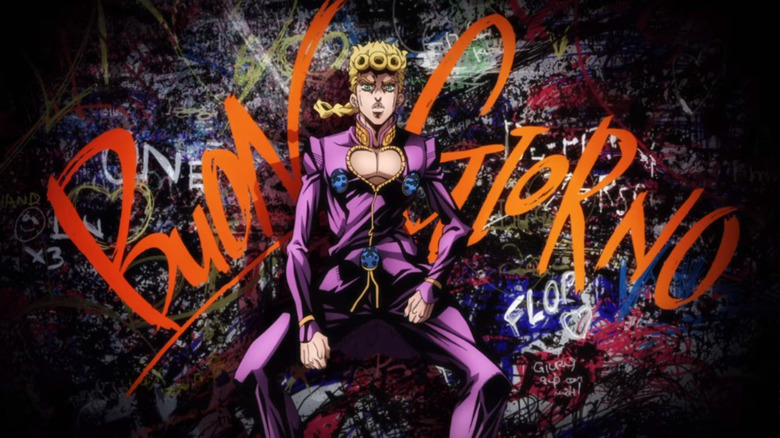"Jojo's Bizarre Adventure" has a devoted audience in Japan, but it took years before it found a following in the United States. Conventional wisdom says that it was David Production's anime adaptation of the series that led to its acceptance abroad. I would be even more specific and say that it was the anime's theme songs that were responsible. The first "Jojo" theme, "Sono Chi wa Sadame," roared onto the scene like an unholy chimera of a James Bond song and a classic anime power anthem like "Ai wo Torimodose!!" The second, "BLOODY STREAM," matched the swagger of its predecessor to a funky beat. While "Sono Chi wa Sadame" melted the faces of Jojo-curious viewers, "BLOODY STREAM" proved the show's musical stylings weren't a fluke. It helped that the animation accompanying those songs was incredible, courtesy of talented animator Naoki Yoshibe and his crew.
The fifth arc of the "Jojo" anime, "Golden Wind," aired in 2018, six years after the first season's premiere. Right away, the animators had a lot to live up to. The preceding season, "Diamond is Unbreakable," was a series high point. Key talent from that season were tied up in an adaptation of the popular soccer drama "Captain Tsubasa." Kenichi Suzuki, a director who had been involved with "Jojo" from the beginning, was busy at P.A. Works directing an original show called "Fairy gone." To top it all off, "Golden Wind" was one of the most beloved "Jojo" arcs in Japan. Fans would be very upset if the production fell through the cracks. But the"Jojo" staff had a plan to keep those fans happy. They reunited the singer and composer behind "BLOODY STREAM" to produce the theme song to "Golden Wind." The song's name: "FIGHTING GOLD."
Like A Bloody Storm
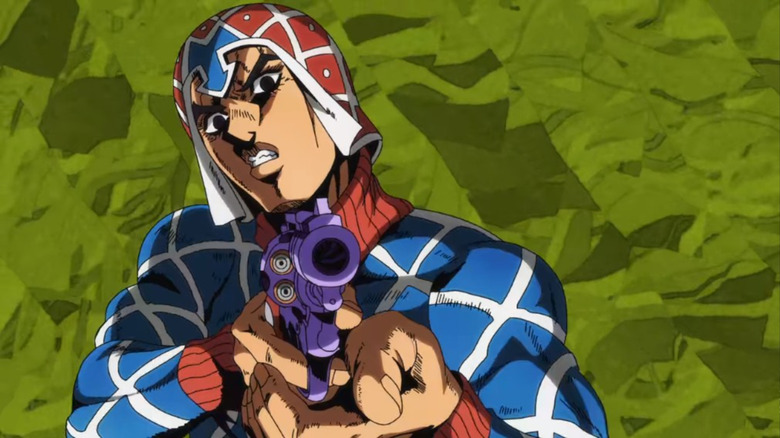
Anime theme songs are a tricky business. They're the first thing fans associate with a show, and thus have tremendous power. Play a "One Piece" fan "We Are!" and they will cry spontaneously. Offer them a dozen remixes on CD and they will buy them all. "We Are," though, is an old-fashioned song, designed first and foremost as a theme tune. Plenty of other anime have used upcoming singles by popular musicians, depending on the connections of the producers. Others have chosen memorable deep cuts, like the use of Asa-Chang and Junray's haunting "Hana" in "Flowers of Evil." When those don't work, there's always voice actors on tap. Convince an idol group like Sphere or a popular voice actor like Mamoru Miyano to star in your anime, and you have both talent and a theme tune on lock.
The ending themes of "Jojo's Bizarre Adventures" are mostly pre-existing songs, including truly wonderful choices like Savage Garden's "I Want You" and Jodeci's "Freek'n You." But the opening themes are all original songs, featuring a strong roster of talent. The first of these themes, "Sono Chi wa Sadame," was written by Shoko Fujibayashi and composed by legendary composer Kohei Tanaka. These two had previously written and composed, believe it or not, "We Are!" The final ingredient was Hiroaki "Tommy" Tominaga, the lead singer of the "Super Brass Rock Band" BLUFF. The producers of "Jojo" would repeat this recipe for "BLOODY STREAM," uniting anime composer royalty with an up-and-coming vocalist.
Power Couple
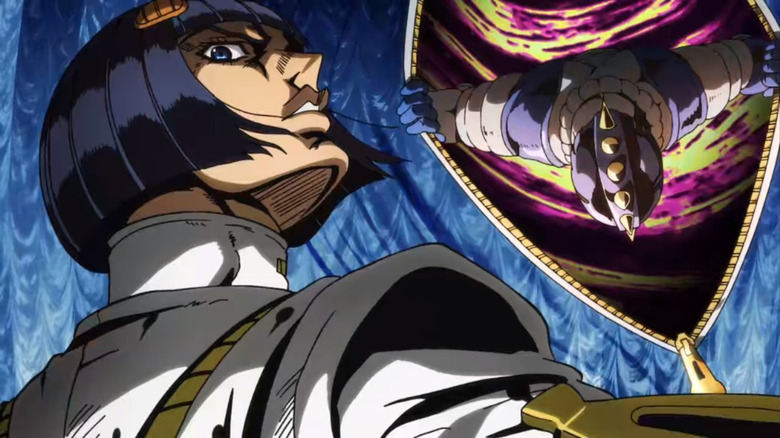
The first half of the duo behind "BLOODY STREAM" and "FIGHTING GOLD" is Toshiyuki Omori, who composed and arranged both songs. Omori's career stretches back to the late 80s', when he contributed the score to "Urusei Yatsura 5: The Final Chapter," the fifth in a series of films based on the popular comedy series. He would come into his own in the '90s and '00s, composing the theme tune to classic science-fiction dramedy "Martian Successor Nadesico" as well as the soundtrack to the boy's action series "Shaman King." Not to mention an arranger credit on "Cruel Angel's Thesis," the theme song for "Neon Genesis Evangelion." According to his website, his work extends even to mainstream Japanese television, where he composed tunes for the Japanese public broadcaster NHK.
The second half is Kazuso Oda, the lead singer of the band No Regret Life. Oda formed the band along with Ryuuta Hashiguchi and Yuka Shimokariya (later replaced by Genta Matsumura.) They composed the ninth ending theme to "Naruto," "Lost Words," and released several albums before breaking up in 2013. The year before the band's dissolution, Oda sang vocals for "BLOODY STREAM" under the pseudonym Coda. He would later be recruited into JO☆STARS, a "Jojo's Bizarre Adventure" supergroup featuring the aforementioned BLUFF vocalist Tommy Tominaga as well as "Stardust Crusaders" theme vocalist Jin Hashimoto. Oda may be better known by English-speaking fans as Coda these days rather than by his given name.
Going Back To The Original Thinking
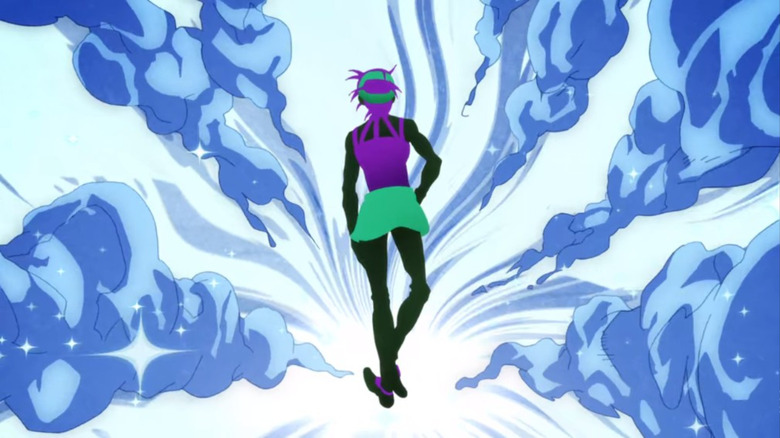
"FIGHTING GOLD" is more serious in tone than the comparatively laid-back "BLOODY STREAM." The dramatic strings and vocals remind the viewer that the fifth arc is a mafia story, rather than the globe-trotting adventure tale of the second arc. Listen to these songs one after the other, though, and the link is clear. "FIGHTING GOLD" is indisputably a creation by the talent behind "BLOODY STREAM," but also indisputably its own creation. Perfectly fitting for a series that has kept fresh by constantly changing its cast and setting, while maintaining that bizarre "Jojo" appeal.
In an interview with Anime News Network, Warner Bros producer Hiroyuki Omori speaks of "going back to the original thinking" in producing the theme song to "Golden Wind." "We didn't want to risk becoming arrogant about…the positive reactions we were already seeing from fans at the announcement," he said. "We wanted to put in a sincere effort for this new theme song to be great." Four seasons in, with a growing fanbase and its home studio in the midst of growing pains, the staff behind the "Jojo" anime might have chosen to rest on its laurels. But even with many of the show's key players tied up elsewhere, the crew at David Production managed to deliver a respectable adaptation of "Golden Wind." Making sure that "FIGHTING GOLD" hit home was just the first step of this grueling process.
A Coda
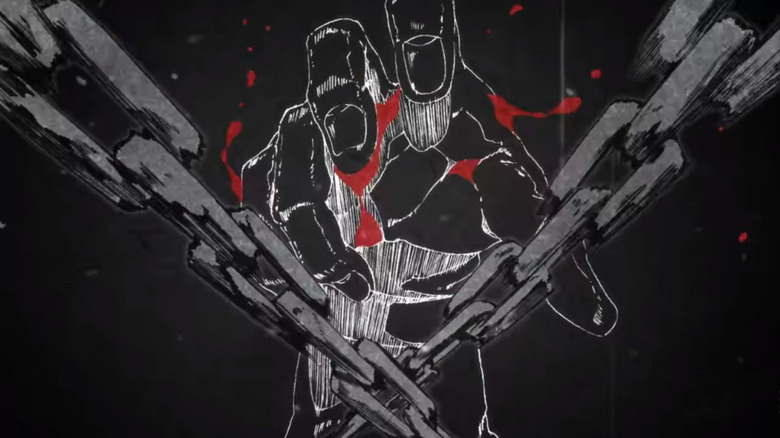
The sixth arc of "Jojo's Bizarre Adventure," "Stone Ocean," began airing in December 2021. The theme song, "STONE OCEAN," is once again a banger. But David Production is now in an even more precarious position than it was during the production of "Golden Wind." In addition to the new season of "Jojo," they have been toiling away on remakes of "Urusei Yatsura" and "SPRIGGAN." Next year they are to animate the boy's action comic "Undead Unluck." The sheer excess of work they are taking on has finally led "Jojo" to suffer. Despite featuring "Jojo" stalwarts Kenichi Suzuki and Toshiyuki Kato in the driver's seat, "Stone Ocean" is the most threadbare the series has looked since the very first season.
The animators are not to blame in this situation. In fact, they are probably working as hard as they can right now to keep "Stone Ocean" above water. The problem is in the anime industry itself, which consistently prioritizes quantity over quality. David Production has now become associated with retro projects, giving beloved properties like "Urusei Yatsura" a second life on television screens. But fans didn't fall in love with the "Jojo" anime because it was based on a classic comic. They fell in love with it because it consistently found ways to surprise and amuse the viewer despite the production being held together with duct tape. "Stone Ocean" retains some of that charm, since the source material is so good. But at this rate, it'll take more than a great theme song for David Production to get out of this jam.
Read this next: Anime Shows Like Cowboy Bebop That Are Worth Your Time
The post Golden Wind Reunited Two Key Talents From the Early Days of JoJo's Bizarre Adventure appeared first on /Film.

